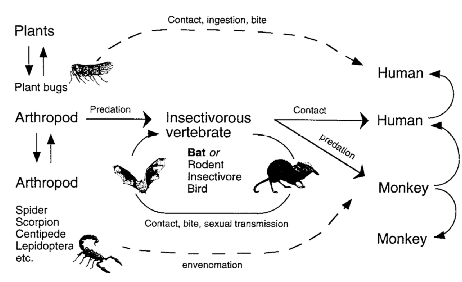Are Plants Ebola's Natural Reservoir?
- Evidence Supporting Plants as the Natural
Reservoir
- Ebola is extremely pathogenic in vertebrates, killing them quickly
rather than allowing persistence of the virus. This suggests that a
non-vertebrate could be the natural host/reservoir.
- The great difficulty researchers are having at identifying the natural
host/reservoir
- Primates do not appear to have an immune response to Ebola, which would
indicate that vertebrates did not evolve with Ebola (2)
- Ebola outbreaks in in the chimpanzee population in the Tai Forest seem
to coincide with the flowering/fruiting cycle of a particular species
of a plant (3).
- An agent morphologically similar to a filovirus was found in a leafhopper
(Psammotettix species) from France (4).
- EBO virus antibodies were found in guinea pigs (vegetarians) in the
Democratic Republic of the Congo (formerly Zaire) (5).
 Image from Monath (2)
Image from Monath (2)
- Evidence Against Plants as the Natural
Host/Reservoir
- Dr. Swanepoel's study of 24 different species of plants failed to identify
a species of plant that Ebola replicated in. However, 13 species of plants
died from mechanical injury from being inoculated with the virus (1).
- Unresolved
Issues
- How homologous to Ebola is the genomic sequence of the "filovirus-like
particle" that was detected in a leafhopper in France (4).
- Were the Ebola antibodies that the guinea pigs in the DRC had protective
against Ebola? If so, guinea pigs and, perhaps, the flora they eat could
be directly involved in the transmission cycle of Ebola.
References:
- Swanepoel,
R. et al. "Experimental Inoculation of Plants and Animals with Ebola Virus."
Emerginging Infectious Diseases, 2 (4). 321-25. October-December
1996.
- Monath, Thomas. "Ecology of Marburg and Ebola Viruses: Speculations
and Directions for Future Research." Journal of Infectious Diseases.
1999;179(Suppl 1):S127-38.
- The Coming Plague (movie).
- Lundsgaard T. "Filovirus-like particles detected in extracts from the
leafhopper Psammotettix alienus [abstract]. Presented at: International
Colloquium on Ebola Virus Research (Antwerp, Belgium, 4-7 September 1996).
Co-organizers: National Institutes of Health (Bethesda) and Institute of Tropical
Medicine (Antwerp). 1996.
- Johnson KM, et al. "Ecology of Ebola virus: a first clue?" Journal
of Infectious Diseases 1981;143:749-50.
©1999 Tara Waterman
